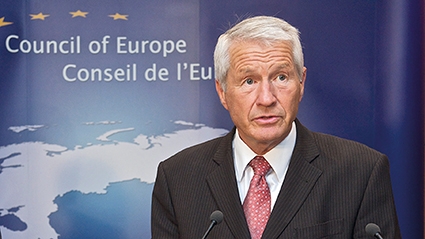CoE Sec Gen: All LGBTI Persons Must Be Protected from Discrimination in Law & Practice
Ahead of the International Day Against Homophobia, Transphobia and Biphobia marked on May 17, Council of Europe (CoE) Secretary General Thorbjørn Jagland urged for justice and full protection against discrimination for all persons, irrespective of their sexual orientation, gender identity and sex characteristics, in all the Council of Europe member states.
“There must be no discrimination on the grounds of sexual orientation and gender identity, and this prohibition must be clearly spelled out in the law and implemented in practice in all our member States,” Jagland said.
He added that the future discussions in the Committee of Ministers on the review of the 2010 Recommendation on Combatting Discrimination on Grounds of Sexual Orientation or Gender Identity will allow member states to show political will and further the progress in protecting everyone from discrimination.
The majority of the Council of Europe member states have expressly prohibited discrimination on the basis of sexual orientation in their anti-discrimination legislation, or in specific laws regulating employment, education, health, goods and services. A smaller number of states have expressly banned discrimination on the gender identity basis.
Secretary General also raised the issue of medical operations required for legal gender recognition (the process of changing name and gender of transgender persons in official documents and registries).
“European states must bring their legislation and practices in line with the case law of the European Court of Human Rights in this area,” he said.
Compulsory sterilization requirements are still applied in the process of gender recognition in thirteen member states (Armenia, Azerbaijan, Bosnia and Herzegovina, Bulgaria, Czech Republic, Finland, Georgia, Latvia, Montenegro, Romania, Serbia, Slovakia, and Turkey); this contravenes the landmark ECtHR judgment on the case of A.P., Garçon & Nicot vs France (2017) in which the European Court ruled that making legal gender recognition conditional on undergoing operation or sterilizing treatment amounted to a breach of the right to respect for private life. In many of the Council of Europe member states, no formal procedures for legal gender recognition exist altogether, despite the 2010 Recommendation by the Committee of Ministers which called on states to guarantee “the change of name and gender in official documents in a quick, transparent and accessible way.”
Medical operations are an issue for intersex persons, too. Stereotyping and lack of awareness often result in medically unnecessary interventions which violate the bodily integrity and the rights of intersex persons. The Parliamentary Assembly of the Council of Europe in its Resolution 2191 (2017) called on all member states to ban unnecessary “sex-normalizing” surgeries carried out without the informed consent of the person concerned.
The protection of bodily integrity has been addressed by the Council of Europe through various legal instruments, including the Convention on Human Rights and Biomedicine.
COE PRESS RELEASE












